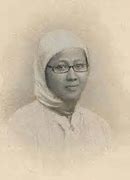Educated at Dutch Schools
As a child, Kartini was very active, playing and climbing trees. She earned the nickname "little bird" because of her constant flitting around. A man of some modern attitudes, her father allowed her to attend Dutch elementary school along with her brothers. The Dutch had colonized Java and established schools open only to Europeans and to sons of wealthy Javanese. Due to the advantages of her birth and her intellectual inclination, Kartini became one of the first native women allowed to learn to read and write in Dutch.
Despite her father's permission to allow her a primary education, by Islamic custom and a Javanese tradition known as pingit, all girls, including Kartini, were forced to leave school at age 12 and stay home to learn homemaking skills. At this point, Kartini would have to wait for a man to ask for her hand in marriage. Even her status among the upper class could not save her from this tradition of discrimination against women; marriage was expected of her. For Kartini, the only escape from this traditional mode of life was to become an independent woman.
Letters Ultimately Published
Kartini's legacy is found in the many letters she wrote to friends in Holland. In 1911 a collection of her Dutch letters was published posthumously, first in Java and then in Holland as Door Duisternis tot Licht: Gedachten Over en Voor Het Javanese Volk ("From Darkness to Light: Thoughts about and on Behalf of the Javanese People"). The book was then translated into several languages, including French, Arabic, and Russian, and in 1920 was translated by Agnes Louis Symmers into English as Letters of a Javanese Princess. In 1922 Armijn Pane finally translated the book into the Javanese language under the title Habis Gelap Terbitlah Terang ("After Darkness, Light Is Born"), which he based on a verse found in both the Bible and the Qur'an in which God calls people out of the darkness and into the light. More recently, Kartini's granddaughter, Professor Haryati Soebadio, re-translated the letters and published them as Dari Gelap Menuju Cahaya, meaning "From Darkness into Light."
Kartini's letters spurred her nation's enthusiasm for nationalism and garnered sympathy abroad for the plight of Javanese women. Syrian writer Aleyech Thouk translated From Darkness into Light into Arabic for use in her country, and in her native Java Kartini's writings were used by a group trying to gain support for the country's Ethical Policy movement, which had been losing popularity. Many of Kartini's admirers established a string of "Kartini schools" across the island of Java, the schools funded through private contributions.
Kartini's beliefs and letters inspired many women and effected actual change in her native Java. Taking their example, women from other islands in the archipelago, such as Sumatra, also were inspired to push for change in their regions. The 1945 Constitution establishing the Republic of Indonesia guaranteed women the same rights as men in the areas of education, voting rights, and economy. Today, women are welcome at all levels of education and have a broad choice of careers. Kartini's contributions to Indonesian society are remembered in her hometown of Jepara at the Museum Kartini di Jepara and in Rembang, where she spent her brief married life, at the Museum Kartini di Rembang.
Wrote Letters to Holland
From 1900 to 1904 Kartini stayed home from school in according to the dictates of Javanese tradition; she found an outlet for her beliefs in letters she wrote in Dutch and sent to her friends in Holland. Kartini was unique in that she was a woman who was able to write; what set her apart even further was her rebellious spirit and her determination to air concerns that no one, not even men, were publicly discussing.
Kartini wrote to her European friends about many subjects, including the plight of the Javanese citizenry and the need to improve their lot through education and progress. She recounts how Javanese intellectuals were put in their place if they dared to speak Dutch or to protest. She also describes the restrictive world she lived in, rife with hierarchy and isolationism. In 1902 Kartini wrote to one letter, to Mrs. Ovink-Soer, that she hoped to continue her education in Holland so that she could prepare for a future in which she could make such education accessible to all women.
Kartini is most known for writing letters in which she advocates the need to address women's rights and status, and to loosen the oppressive Islamic traditions that allowed discrimination against women. She protests against education restricted to males of the nobility, believing that all Javanese, male and female, rich and poor, have the right to be educated in order to choose their own destiny. Women especially are not allowed to realize their calling. As Nursyahbani Katjasungkana commented in the Jakarta Post, "Kartini knew and expounded the concept that women can make choices in any aspect of their lives, careers, and personal matters."
PWMJATENG.COM, Surakarta – Arimby Dwinda Putri, mahasiswa Psikologi Universitas Muhammadiyah Surakarta (UMS), berhasil dinobatkan sebagai Ajeng Kartini Jawa Timur 2024. Gelar prestisius…
ums.ac.id, SURAKARTA – Mahasiswa Psikologi Universitas Muhammadiyah Surakarta (UMS), Arimby Dwinda Putri dinobatkan menjadi Ajeng Kartini Jawa Timur 2024.
Arimby mengungkapkan prosesnya dari awal pendaftaran hingga semifinal, dirinya sempat bolak balik Solo-Surabaya untuk mengikuti ajang bergengsi tersebut. Terdapat total 150-an peserta yang mendaftar dari berbagai daerah di Jawa Timur.
“Saat semifinal saya ke Surabaya untuk mengikuti sesi wawancara tentang advokasi. Tidak hanya itu, terdapat juga wawancara tentang personal kemudian masuk finalis,” ungkapnya Minggu, (18/8).
Sebelum grand final, lanjutnya, ada pra karantina. Banyak proses yang dilalui dan ada tahap wawancara lagi dan lebih mendalam. Pada wawancara tersebut, Arimby juga diberikan pertanyaan akan kontribusinya nanti saat terjun ke masyarakat.
“Alhamdulillah masuk 5 besar dan setelah pengumuman mendapatkan juara satu sebagai Ajeng Kartini Jawa Timur tahun 2024,” tambah Mahasiswa Psikologi UMS angkatan 2023 itu.
Menurutnya, walaupun sedikit melelahkan karena harus bolak balik Solo-Surabaya tetapi senang karena ajang tersebut menjadi wadah untuk dapat mengembangkan dan memajukan perempuan, khususnya pemberdayaan perempuan di Jawa Timur sendiri.
“Saya ingin berkontribusi lebih besar untuk memberdayakan perempuan di Jawa Timur dan lebih bisa mengusahakan hak-hak perempuan juga pastinya,” tegas Arimby.
Hal tersebut direspon oleh Kepala Biro Kemahasiwaan UMS, Ahmad Kholid Alghofari, ST., MT., yang mengungkapkan bahwa prestasi tersebut dalam mengembangkan kemampuan yang dimiliki oleh mahasiswa, baik dalam bidang akademik maupun non akademik.
“Kami selalu support mahasiswa yang memiliki berbagai prestasi mulai sedini mungkin, dan mendorong untuk mahasiswa turut aktif dalam mengembangkan berbagai kemampuan dan kapasitas selama menjadi mahasiswa UMS,” tegasnya Kabiro Kemahasiswaan UMS itu.
Hal tersebut sangat membanggakan, lanjutnya, bukan hanya bagi mahasiswa maupun program studinya, tetapi membawa nama Universitas Muhammadiyah Surakarta. (Fika/Humas)
Raden Ajeng Kartini (1879-1904) is credited with starting the move for women's emancipation in Java, an island then controlled by Holland as part of the Netherlands Indies (now Indonesia). Born to the aristocracy, Kartini was privileged to be able to attend Dutch colonial schools, but was forced to quit at an early age due to Islamic law at the time. At the age of 24, she was married to a man twice her age who already had three wives. Kartini wrote letters to her friends in Holland protesting the treatment of women in Java, the practice of polygamy, and of the Dutch suppression of the island's native population. Decades later, the Indonesian state constitution promised gender equality to all its citizens, and Kartini Day continues to be celebrated on April 21 to commemorate Kartini's contribution to women's rights.
Kartini was born on April 21, 1879, in Mayong village near of Jepara, a town located in the center of the island of Java. She was born into the Javanese priyayi, or aristocracy; her father was Jepara mayor Raden Mas Adipati Ario Sosroningrat. Kartini was one of 12 children born to Raden's several wives.
Promoted Nationalist Movement
Fearful of losing control over their island territory, the Dutch colonialists believed that knowledge of European languages and education could a be dangerous tool in the hands of the native Javanese. Consequently, they suppressed the activities of the native people, keeping them as peasants and plantation laborers, while at the same time counting on the Javanese nobility to support them in their rule over the region. Only a few of the nobility, Kartini's father included, were taught the Dutch language. Kartini believed that once the Europeans introduced Western culture to the island, they had no right to limit the desire of native Javanese to learn more. Clearly, by the late nineteenth century there was talk of independence. With her letters and her egalitarian fervor, Kartini can be said to have started the modern Indonesian nationalist movement.
Kartini was not proud of being set apart from her countrymen as one of the privileged few of the aristocracy. In her writings she described two types of nobility, one of mind and one of deed. Simply being born from a noble line does not make one great; a person needs to do great deeds for humanity to be considered noble.
Kartini Day Declared National Holiday
In Indonesia, April 21, Kartini's birthday, is a national holiday that recognizes her as a pioneer for women's rights and emancipation. During the holiday women and girls don traditional clothing to symbolize their unity and participate in costume contests, cook-offs, and flower arrangement competitions. Mothers are allowed the day off as husbands and fathers do the cooking and housework. Schools host lectures, parades are held, and the women's organization Dharma Wanita specially marks the holiday.
In more recent years criticism has arisen regarding the superficial observance of Kartini Day. Many now chose not to commemorate it, and it has increasingly been eliminated from school calendars. What saddens historians and activists is that Kartini has become a forgotten figure for the younger generation, who cannot relate to the achievements she wrought in a repressive society that is now almost forgotten. Historians have also debated the role Kartini herself played in promoting women's emancipation. Other than her letters, some have argued that she was a submissive daughter, feminine but not necessarily a feminist.
The film biography R. A. Kartini was produced to highlight her efforts to promote women's emancipation and education. Based on her published letters as well as memoirs written by friends, the film presents the two aspects of Kartini's life: her brief public life which had minimal effect, and her letters which, after her death, had profound influence on women all over the world. The film, written and directed by Indonesian filmmaker Sjuman Djaya, recreates Kartini's family life, ambitions, and the historical context of life under Dutch colonialism. Kartini is also remembered through businesses inspired by her vision. Kartini International, based in Ontario, Canada, advocates for women's education and rights, and won the 2000 Canadian International Award for Gender Equality Achievement for its work.
Kartini, R. A., Letters from Kartini: An Indonesian Feminist, 1900-1904, Monash Asia Institute, 1994.
—, On Feminism and Nationalism: Kartini's Letters to Stella Zeehandelaar, 1899-1903, Monash Asia Institute, 1995.
Palmier, Leslie, Indonesia, Walker & Co., 1965.
Jakarta Post, April 21, 2001; April 20, 2002.
Chaniago, Ira, "Raden Ajeng Kartini—A Pioneer of Women's Education in Indonesia," University of New England Web site,http://www.une.edu.au/unepa/Gradpost/gp_9.3web.pdf (December 23, 2003).
Discover Indonesia Online,http://indahnesia.com/Indonesia/Jawa/ (December 23, 2003).
Monash Asia Institute Web site,http://www.arts.monash.edu.au/mai/ (December 23, 2003).
Raden Ajeng Kartini Djojo Adhiningrat atau acap disapa Kartini merupakan sosok pahlawan Indonesia yang gigih memperjuangkan hak-hak perempuan. Cita-cita luhur Kartini ingin menghapuskan penderitaan perempuan yang terkungkung dalam tembok tradisi dan adat-istiadat masyarakat feodal-patriarkal Jawa. Kala itu, perempuan selalu menjadi potret tragis yang tidak memiliki kebebasan, seperti pelarangan mengenyam pendidikan, adanya pingitan, hingga harus siap dipoligami oleh suami dengan dalih berbakti.
Kartini, melalui surat-surat yang dikirimkan ke sababat penanya mengemukakan pemikiran-pemikirannya dalam mendobrak tradisi feodal-patriarkal yang menghambat kemajuan kaum perempuan. Ia ingin perempuan memiliki masa depan yang lebih maju, bebas, cemerlang, dan merdeka. Ia menganggap pendidikan merupakan jalur mutlak yang diperlukan demi mengangkat derajat perempuan dan martabat bangsa Indonesia. Baginya, pengajaran kepada perempuan secara tidak langsung akan meningkatkan martabat bangsa.
Atas cita-cita dan perjuangannya melalui pemikiran-pemikiran itu Kartini dinobatkan sebagai Pahlawan Nasional Indonesia melalui Keppres Nomor 108 Tahun 1964 tentang Penetapan Kartini sebagai Pahlawan Nasional oleh Presiden Soekarno.
Kartini lahir pada tanggal 21 April 1879 di Mayong, Jepara. Ia merupakan seorang perempuan berdarah ningrat Jawa. Ayahnya yang bernama Raden Mas Adipati Ario Sosroningrat adalah wedana Mayong, yang kemudian menjadi Bupati Jepara, sedangkan ibunya bernama M. A. Ngasirah. Sang ibu merupakan seorang putri dari Nyai Hajjah Siti Aminah dan Kyai Haji Madirono, seorang guru agama di Teluwakur, Jepara.
Putri kelima dari 11 bersaudara ini memang terlahir dari keturunan keluarga cerdas. Kakeknya, Pangeran Ario Tjondronegoro IV menjadi bupati pada usia 25 tahun. Dia adalah bupati pertama yang mendidik anak-anaknya dengan pelajaran khas Barat, langsung dari seorang guru asli Negeri Belanda.
Sifat progresif kakeknya yang memberikan pendidikan Barat pada putra-putranya, diwarisi oleh sang ayah Sosroningrat. Dia menyekolahkan semua anaknya ke Europese Large School, sekolah gubernemen kelas satu yang memakai bahasa Belanda sebagai bahasa pengantar dan diperuntukkan bagi orang-orang Belanda dan Jawa yang tersohor.
Pada 1885 Kartini mulai bersekolah di Europese Large School (ELS). Di sekolah inilah untuk pertama kalinya Kartini mendapatkan bahan bekal perjuangannya. Setamatnya di ELS, Kartini ingin meneruskan pendidikannya ke Semarang, di Hoogere Burgerschool (HBS). Kartini pernah ditawari untuk sekolah ke Belanda oleh gurunya. Namun, sang ayah tidak lagi memberi izin dan Kartini tak kuasa melawan.
Ia bersekolah hanya sampai usia 12 tahun, dan terpaksa harus keluar untuk menjalani masa pingitan. Masa-masa inilah disebut Kartini bagai ‘dalam penjara’. Kartini tidak banyak bergaul selama masa pingitannya. Justru, ia mulai merenung tentang nasib perempuan yang terkungkung adat dan tidak bisa menentukan masa depannya sendiri.
Dalam masa pingitan tersebut Kartini mengasah pemikirannya dengan banyak belajar seorang diri. Sebab bisa berbahasa Belanda, maka di rumah ia mulai belajar dan menulis surat kepada teman-temannya yang berasal dari Belanda, salah satunya Rosa Abendanon.
Memasuki usia 16 tahun, Kartini dibebaskan dari masa pingitan. Kemudian, ia banyak belajar sendiri. Lantaran menguasai bahasa Belanda, maka ia mulai belajar dan menulis surat kepada teman-temannya yang berasal dari Belanda.
Stella Zeehandelaar, kawan pena Kartini, menyarankan kepada Ir. H. H. van Kol (anggota parlemen Belanda yang satu partai dengan Stella) agar mengunjungi putri-putri Bupati Sosroningrat. Ia menjelaskan bagaimana keinginan Kartini dan Roekmini (adiknya) untuk bisa belajar ke Belanda.
Pada 20 April 1902, van Kol yang didampingi wartawan De Locomotief, Stoll, tiba di Jepara dan disambut dengan sangat ramah oleh keluarga Bupati Jepara. Di sinilah kesempatan van Kol untuk berbincang dengan Kartini, sekaligus membicarakan beasiswa itu. Kartini diminta untuk segera membuat surat permohonan.Berkat peran Van Kol memperjuangkan beasiswa Kartini dalam sidang Tweede Kamer pada 26 November 1902, Menteri Seberang Lautan A. W. F. Idenburg menyetujui untuk memproses beasiswa tersebut.
Kendati jalan sudah terbuka, tapi ia batal ke Belanda karena alasan politis. Alasan itulah yang menjadikan Kartini kembali memilih berkorban demi ketenteraman keluarga dan mengorbankan pamrih pribadi. Lantas, ketika beasiswa dari Belanda akhirnya benar-benar datang, Kartini menyarankan supaya Agus Salim yang berangkat.
Memasuki usia 24 tahun, Kartini menyadari bahwa usahanya untuk bersekolah lagi tak akan pernah terlaksana. Saat ia menunggu keputusan beasiswa dari Batavia, tiba-tiba Bupati Sosroningrat menerima utusan Bupati Djojoadhiningrat dari Rembang yang membawa surat lamaran untuk Kartini.
Kartini tak mampu menolaknya. Ia lantas menyetujui saran ayahnya untuk menikah, dengan berbagai alasan, antara lain, di Rembang ia bisa meneruskan cita-citanya membuka sekolah didampingi seorang suami yang berpendidikan tinggi serta memiliki kekuasaan. Ia pun resmi menjadi seorang istri dari duda yang telah memiliki tujuh anak dan dua orang selir.
Opened School for Girls
Rather than remaining submissive and compliant, like a good Javanese daughter, the unconventional Kartini often had disagreements with her father, and it is believed that her family was, consequently, eager to marry her off. On November 8, 1903, she obeyed her father and married Raden Adipati Joyoadiningrat, the regent of Rembang. Joyoadiningrat was a wealthy man of age 50 who already had three wives and a dozen children. Kartini—who was, at 24 years of age, considered too old to marry well—found herself a victim of polygamy. She was devastated by the marriage, which ended her dream of studying abroad just as she was awarded a scholarship to study in Europe.
Despite the marriage, in 1903 Kartini was able to take a first step toward achieving women's equality by opening a school for girls. With aid from the Dutch government Kartini established the first primary school in Indonesia especially for native girls regardless of their social standing. The small school, which was located inside her father's house, taught children and young women to read and make handicrafts, dispensed Western-style education, and provided moral instruction. At this time, Kartini also published the paper "Teach the Javanese."
Kartini's enthusiasm at educating Indonesian girls was short lived. On September 17, 1904, at the age of 25, she died while giving birth to her son. Kartini is buried near a mosque in Mantingan, south of Rembang.




